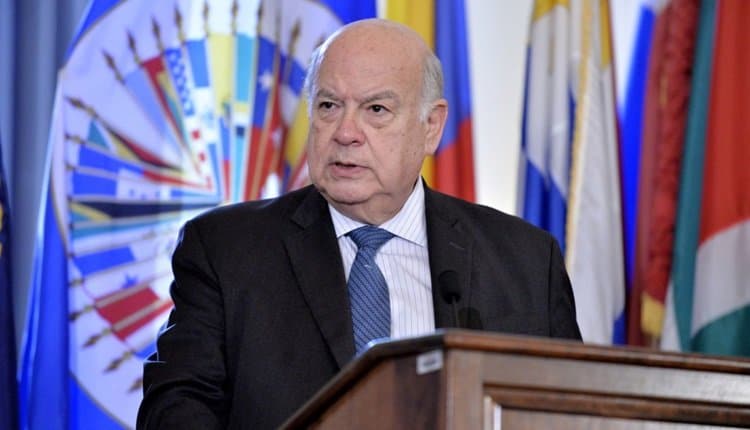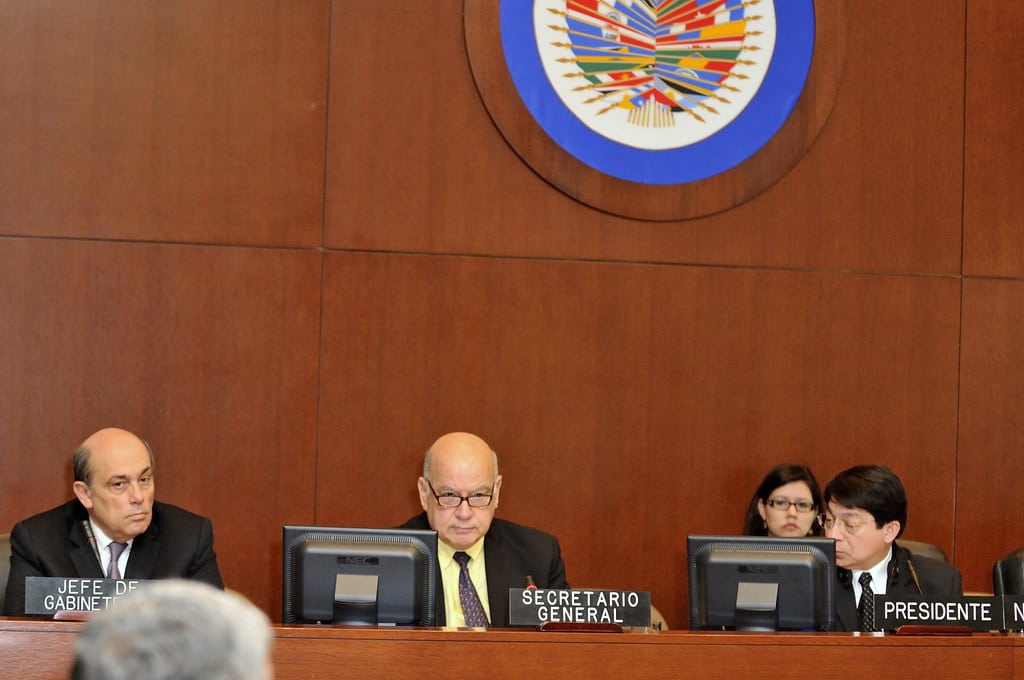24 de noviembre 2021

Children of Exile: The Births “Sowing Hope” in the Camp of Nicaraguan Farmers

PUBLICIDAD 1M
PUBLICIDAD 4D
PUBLICIDAD 5D
Former OAS Secretary General warns: “There are no forms of direct intervention, regime change has to take place within Nicaragua”

Former OAS Secretary General warns: “There are no forms of direct intervention
Chilean Senator José Miguel Insulza, former Foreign Minister of his country and former Secretary General of the OAS between 2005 and 2015, considered that with the exit of Nicaragua from the OAS, announced by Foreign Minister Denis Moncada, and its eventual suspension by a Special General Assembly, “Daniel Ortega has managed to completely isolate Nicaragua, and that is dramatic for a country that is, finally, one of the most backward in Latin America”.
In this interview with Esta Semana and CONFIDENCIAL, Insulza warns that despite the isolation, “there are no forms of direct intervention. Government changes cannot be made from outside; the famous regime change has to take place inside Nicaragua”.
This Friday, November 19, Daniel Ortega's regime announced the beginning of its withdrawal from the Organization of American States, which will take at least two years, while the OAS is debating the eventual suspension of Nicaragua for violations to the Inter-American Democratic Charter. What are the political and legal consequences of this decision?
Well, political consequences are important. Do not forget that other countries have been suspended from the OAS, as was the case of Cuba, which never denounced the Charter. Cuba has never denounced the OAS Charter, Cuba continues to be a member of the OAS, and continues to have the possibility of participating. Honduras, when it was suspended, did not do so either; and the truth is that the only one who has done so is Nicolás Maduro in the case of Venezuela, and in fact he did so for a very simple reason: because he was totally opposed to any relationship with the Inter-American Commission on Human Rights, and since the Inter-American Commission on Human Rights is the main body of the OAS, that is, it is in the Charter, Maduro chose to denounce the Charter, that was the reason why he did so.
Ortega is doing it, fundamentally, because he feels, as he says, persecuted, but the truth is that it would be strange that among 33 countries, they were to persecute one. And the vote was very impressive because there was only one vote against and some abstentions. Abstention from neighboring countries and from countries that once had some affinity with Nicaragua, such as Mexico, are valuable, because it means: “Look I am not going to vote against you, but I am not going to support you either”, which is something quite strong.
I believe that Ortega really managed to isolate Nicaragua completely, and that is dramatic for a country that is, finally, one of the most backward in Latin America, because in reality, the classic social rates such as income rates, per capita income, health care, education, etc., are very bad in Nicaragua, so it is not a country that can afford to isolate itself from the continent and from the world.
And does this isolation, the exit or suspension of Nicaragua from the OAS, also extend to the jurisdiction of the Inter-American Commission on Human Rights, the Court, the Inter-American Bank and PAHO?
Of the first there is no doubt, but it has to denounce the American Convention on Human Rights, and I understand that is separate. Although all the signatories of the American Convention on Human Rights are members of the OAS, they are two different international treaties, the Convention and the OAS Charter are different international treaties.
But does it (Nicaragua) exit from the Inter-American Development Bank?
What happens is that when some countries are suspended from the OAS, they are suspended from all the organizations of the system at that moment; I do not know if this works the other way around, but I think you may be right, because the agreement that created the IDB is an OAS agreement, so the exit from the IDB would probably also be automatic; but I think that what will happen in the end is that the General Assembly will suspend Nicaragua, and that will also mean its suspension from the IDB and from all the other organizations.
There has already been talk about the application of Article 21 of the Democratic Charter within the OAS, which would lead to the suspension of Nicaragua from the organization. Can the OAS move forward in this direction despite Nicaragua's withdrawal?
Yes, Nicaragua is still a member of the OAS until November 18, 2023, and all the measures that apply to it are still applicable. And what has to happen now is that a Special General Assembly has to be called, and that Special General Assembly declares that the fundamental principles of democracy have been violated or democracy has been violated in Nicaragua.
At the moment the OAS has 34 member states. As I said, an Assembly is called, and during that Assembly, Nicaragua is made to see that it has violated a set of principles, etcetera, and it is given time to reconsider and change its attitude, otherwise the Assembly is asked to suspend it. The suspension has to be approved by two thirds of the votes. There are 24 votes, and therefore, if there were already 25, I imagine that there will be 25 again.
There are those who suggest that the OAS should integrate a commission of the highest level, together with the European Union and the UN Secretary General, to summon Ortega. Is that viable, considering that Ortega rejected the OAS Good Offices Commission for dialogue in 2020?
Look, the truth is that there are no forms of direct intervention. You can isolate a country, but you cannot remove the government, that is to say, you cannot change governments from the outside. The famous regime change has to take place within Nicaragua, that is a reality that has to be recognized.
Now, to me, a Commission with the United Nations, and above all with the European Union, seems possible. The United Nations has some major difficulties, in the case of Nicaragua this would depend very much on the permanent members of the Security Council, who are the ones who can veto a resolution: United States, China, Russia, France and England. I believe that China, curiously enough, would not necessarily be against this, because as you know, Nicaragua still maintains relations with Taiwan, thus, it recognizes the Government of Taiwan as the Republic of China, and that Government is not part of the United Nations; therefore, the only strong problem in this decision would be the possibility of Russia exercising a veto.
In 2009, you were Secretary General of the Organization of American States when Honduras was suspended after the coup d'état against President Manuel Zelaya. The OAS Secretariat, under the leadership of Luis Almagro, has declared that there is a rupture of the democratic order in Nicaragua. What differences are there between the case of Honduras in 2009 and Nicaragua in 2021?
The one who has to declare what you mentioned, is the Assembly, not the General Secretariat. That is to say, the one who declares that the democratic regime has broken down in Nicaragua is the General Assembly, and in declaring it, asks the Secretary General to contact the Nicaraguan authorities, make them see the opinion of the Assembly and urge them to change the policies they are carrying out.
That is what I did, there was a General Assembly and I went to Honduras afterwards and I told the Honduran Government; ‘look, there is a vote against what you are doing here, votes that affirm the rupture of democracy, approved by 33 countries, the 34th country was Honduras, which was sitting in the room, represented by President Zelaya, and who abstained from voting, therefore, we want to ask you to reinstate the president.’ (And I expressed) the things for which they were condemned. I received completely contrary responses from the General Assembly, and based on that, I called the Assembly again, I informed the Assembly, and the Assembly condemned, suspended Honduras. That is the procedure, there is no other.

Photo from March 2015. The then Secretary General of the OAS, José Miguel Insulza (center), next to the representative of Nicaragua, Denis Moncada (right). Photo: Archive/Efe
So, if the OAS does not have the 24 votes to suspend Nicaragua, what other alternatives are left?
They cannot suspend it, they need two thirds of the votes.
And what is your assessment of the countries that invoke the supposed principle of non-intervention to abstain from condemning the Ortega regime?
International organizations are not supranational bodies, they are multilateral bodies. As the founder of the OAS, Alberto Lleras Camargo, the first secretary general, said: the OAS will be what its member countries want it to be, there is no supranational power; it is not that 20 countries could say: ‘ah, we are the majority, therefore we…’. They could not do that; the attempt, so to speak, to delegitimize the Maduro regime was attempted, and it did not have enough votes, it never had them.
That is why Maduro decided to withdraw, as I was saying before, not because he was going to be suspended, but because he did not want the Inter-American Commission on Human Rights to continue acting in Venezuela.
In 1979, 42 years ago, the OAS condemned the Somoza regime and demanded its replacement, with the support of Mexico, which was celebrated in Nicaragua by the Sandinista Front. But now Ortega calls the OAS a sewer. What has changed?
Ortega is not the Sandinista of 79. Ortega has a completely arbitrary family dictatorship that does not obey anyone, that does not listen to anyone, that is what has changed; that is, Ortega's dictatorship resembles Somoza's dictatorship, during that time he (Somoza) even appointed his brother and son. Well, he (Ortega) wants to appoint his wife, but the result is the same in the end.
Does the Ortega regime have any support from the democratic left in Latin America or in the governments that define themselves as progressive?
No, it does not have any support, it does not have any support neither from those governments nor from those that abstained. He would probably have the support of the two Latin American countries that are not in the OAS, which are Venezuela and Cuba.
This article was originally published in Spanish in Confidencial and translated by our staff
Archivado como:
PUBLICIDAD 3M
Periodista y productor general de los programas Esta Semana, Esta Noche y Confidencial Radio, dirigidos por Carlos F. Chamorro. Exiliado en Costa Rica desde junio de 2021.
PUBLICIDAD 3D